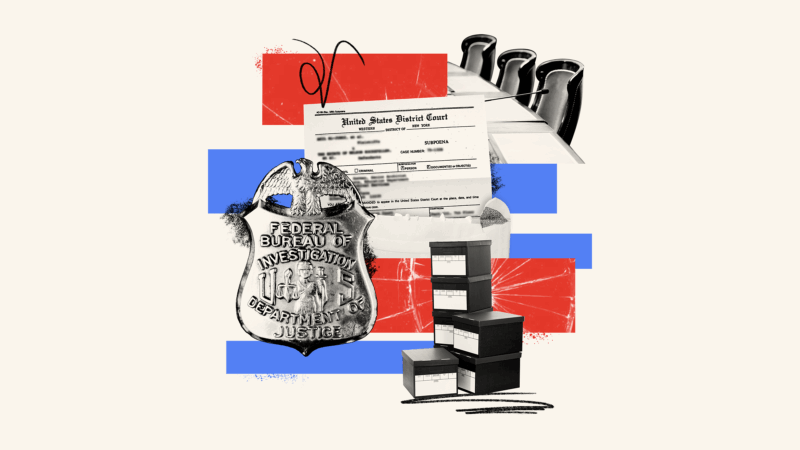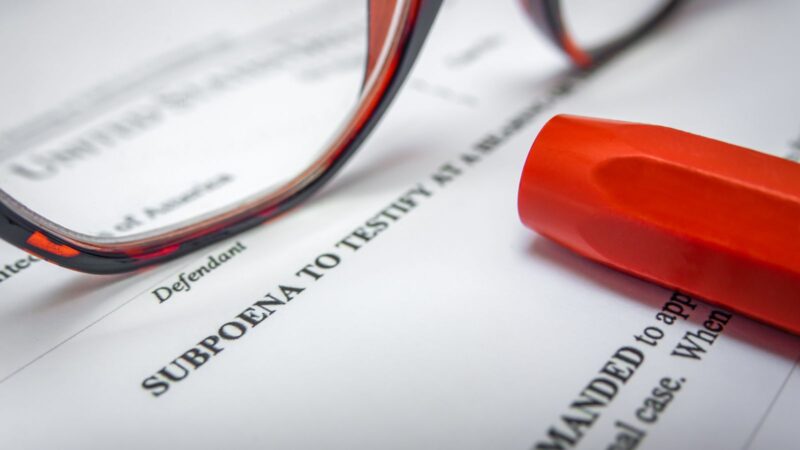Matt Peney supports Protect Democracy’s work to build a broad pro-democracy coalition, conduct federal legislative advocacy, and respond to attacks on the judiciary.
Former Judges and Legal Experts Convene to Discuss Threats to the Rule of Law
- July 31, 2025
On July 10, Protect Democracy and Principles First convened legal, judicial, and law enforcement experts at the National Press Club in Washington, DC to discuss threats to the judiciary and rule of law, misuse of the Department of Justice, threats to the legal profession, and the dangers of these developments to law enforcement.
Panel Participants Included:
Judge John E. Jones
formerly of the U.S. District Court for the Middle District of Pennsylvania
Judge Jeremy Fogel
formerly of the U.S. District Court for the Northern District of California & former Director of the Federal Judicial Center
Judge Paul Michel
formerly of the U.S. Court of Appeals for the Federal Circuit
Ronald Davis
former Director of the Marshals Service
Stuart Gerson
former Acting Attorney General
Liz Oyer
former DOJ pardon attorney
Brenna Trout Frey
Counsel, Lowell & Associates
*Judges are members of Keep Our Republic’s Article III Coalition, a nonpartisan group of former Federal Judges from both political parties dedicated to upholding the Constitutional role of the judiciary and the rule of law.
The discussion was moderated by Heath Mayo, founder of Principles First, and Amit Agarwal, Special Counsel at Protect Democracy and former Solicitor General of Florida.
Threats to judiciaryKey Takeaways
1. Threats to the judiciary are threats to the rule of law
“The biggest threat, I think, to judicial independence… is the ignoring of court orders. When somebody says ‘well court orders are optional’ or ‘court orders don’t mean anything’ or ‘we’re just going to drag our feet we’re not going to comply’ that essentially is intended to neuter the power of the courts.”
Judge Jeremy Fogel (Ret.)
Members of the Trump administration have called for judges who rule against the administration to be impeached, refused to rule out defying court orders, and dismissed the authority of district courts. Noncompliance with court orders threatens the fundamental idea that no one is above the law, and these actions from the administration threaten the public’s trust in courts, their rulings, and the judicial branch as a whole. Ignoring court orders, or treating them as optional, paves the way for rampant abuses of power and an unchecked executive. The panel discussed the impact that these attacks on judges and judicial authority have on judicial independence.
“If judges don’t have to be obeyed by the government, what about everybody else? Is it also optional for them?”
Judge Paul Michel (Ret.)
Disrespect and disregard for court orders threaten the fabric of our society, where everyday citizens expect that the law will be upheld by those around them and support obeying court orders. Panelists discussed how defiance of court orders by the executive paves the way for a breakdown in our system of government and society.
“When you have thought leaders, and elected leaders, and people in the highest office in the land who so denigrate individual judges that’s a problem. And I think it really tears at the fabric of the rule of law and our system of justice.”
Judge John Jones (Ret.)
Threats to judges can lead to the degradation of the rule of law, posing dangers to those who are targeted and making it less likely that principled lawyers will accept judgeships. We have seen a substantial increase in threats to judges as President Trump and his administration continue to question the legitimacy of the judicial branch and criticize court rulings against him. The panelists discussed these threats to judges and the need for retired judges to speak out in support of those on the bench.
DOJ abuse2. Abuse of the Department of Justice is harming ordinary Americans
“You can’t legislate norms, you have to live them. What we need is a population that is more attuned to what’s at risk.”
Former Acting Attorney General Stuart Gerson
We are seeing an erosion of norms and leadership at the Department of Justice, driven by those who see themselves as lawyers for the president and not for the American people. Strong norms are essential to the proper functioning of the Department of Justice, and we have increasingly seen those who have historically upheld these norms forced out of their roles. Independent law enforcement is essential to a democracy rooted in the rule of law, and it is critical that the Department of Justice is staffed by attorneys of good faith who do their best to honor their oaths of office and support and defend the Constitution and laws of the United States. The panelists discussed the dangers that a breakdown in Department of Justice norms pose to ordinary Americans.
“What has happened to the way that the public is viewing pardons, because of how this president has used them, I think is really to the detriment of our justice system as a whole and to the detriment of many deserving people.”
Liz Oyer, former DOJ pardon attorney
While the president has the constitutional power to grant pardons and commutations, there has historically been a vetting process in place within the Department of Justice to ensure that pardons are handled in a way that is transparent and fair. The Trump administration has begun circumventing the traditional pardons process and procedures, and we are seeing pardons granted that have not been vetted by the Department of Justice and seem to be used to reward political loyalty to the administration.
These shifts, from politicizing the office of the pardon attorney to using pardons to reward political loyalty, have done significant damage to how the public views the pardon power and pose a danger to the rule of law. The panelists discussed how they are also harming Americans who have truly earned a second chance and are deserving of pardons and commutations.
Law firm capitulation3. Law firms that capitulate to the administration are damaging the legal profession
“I’ve heard from a lot of law students who are making decisions and choices about what to do next and I think that the number of large firms which cut deals with the Trump administration to avoid executive orders I think it really woke people up to the situation that you can’t have your cake and eat it too when you leave law school now.”
Brenna Trout Frey, Counsel, Lowell & Associates
Attacks on law firms are another prong of the administration’s attacks on the independence of the judiciary. By targeting law firms that have historically sided against the administration, the administration seeks to undermine the constitutional role of the judiciary as a check on abuses of power. Firms that settled with the administration have lost clients, suffered damage to their reputations, and seen attorneys exit the firms in protest. Firms that have stood up to the administration have prevailed in court
The firms that have chosen to capitulate to the administration have often faced setbacks with clients and their reputation, while those that have stood up to the administration have prevailed in court and gained new clients. The panelists discussed the damage the administration is doing to the legal profession, and why it is key that lawyers at these firms stand up for the rule of law.
Court order enforcement4. Politicizing the independent judiciary makes it harder to enforce court orders
“You can have political debates from here to eternity, but it should have nothing to do with the rule of law and judicial security.”
Ron Davis, former Director of the U.S. Marshals Service
The administration’s disrespect for court orders poses a direct threat to law enforcement. United States Marshals, who are responsible to both the executive and judicial branches, could face conflicting orders from the judiciary and the executive.
In order to ensure our courts can function as intended, Director Davis recommended that the Marshals Service be made more of an independent agency, with protections for Marshals who are executing a lawful order given by the courts and higher funding for deputies and administrative staff. Driving this need for more staff is the increased threats to Federal Judges. While policy disagreements can be healthy for a democracy, we must be united around the safety of judges and respecting their role and the role of federal law enforcement in upholding the rule of law. The panelists warned that the ongoing politicization of the judiciary poses a real challenge to federal law enforcement and could make it difficult for lawful court orders to be enforced.
What you can doStanding Up For Courts and the Rule of Law
Our system of checks and balances is fundamental to our system of government, and ensures that no single branch abuses its power. Our Constitution relies on the judicial branch to serve as a check against unlawful abuses of executive power, but actions by the current administration threaten that balance. Noncompliance with court orders, threats to judges and judicial authority, the targeting of law firms and principled DOJ attorneys, and politicization of federal law enforcement present grave threats to our democracy. Fortunately, there are steps each of us can take to respond to the administration’s lawlessness and disregard for the rule of law.
Learn more about Principles First Learn more about Principles First
Learn more about Keep Our Republic’s Article III Coalition Learn more about Keep Our Republic’s Article III Coalition
Related Content
Join Us.
Building a stronger, more resilient democracy is possible, but we can’t do it alone. Become part of the fight today.
Donate
Sign Up for Updates Sign Up for Updates
Explore Careers Explore Careers
How to Protect Democracy How to Protect Democracy


